FOUNDATION STAGE
Intent
At Amesbury CE Primary School, we believe that the learning and development that takes place in the early years is crucial for children’s lives and experiences at school and beyond, helping them to become life-long learners. Our vision is to provide an early education that is both rounded and specific, where breadth and depth are integral, and our approach is holistic. Children learn in multi-modal, playful, and concrete ways, ensuring a rich and varied learning experience.
We are committed to nurturing each child’s right to express their feelings and thoughts through diverse media, supporting them in constructing a comprehensive understanding of their world. Our curriculum includes dance, music, arts, and storytelling, providing numerous opportunities for self-expression and creativity. We recognize the importance of gross and fine motor skills as the foundation for children to interact with the world and as a springboard for later learning, such as writing, cycling, or playing sports.
Our EYFS curriculum is driven to:
- Recognise children’s prior learning and experiences;
- Provide a wide range of rich, first-hand learning experiences which take the curriculum beyond the classroom;
- Allow the children to develop interpersonal skills, build resilience and become critical and creative thinkers and
- Foster the development of each child’s character, including their personal development, health and well-being, preparing them to make a valuable contribution to society.
Our Vision:
Learning and development in the early years is crucial for children’s life and experiences at school and beyond, helping them become life-long learners. This is truly the foundation stage. The 7 areas of learning and the characteristics of effective learning are pivotal in offering children an early education that is both rounded and specific. Here breadth and depth are both important and the approach is holistic – children learn in ways which are multi-modal, playful and concrete.
Our approach centres on our belief in the importance of developing the whole child. We believe that all children are naturally eager to learn and long to be independent. We ensure that we create a welcoming, well-prepared and engaging environment. Our practitioners are caring, supportive and knowledgeable.
Implementation:
Our EYFS curriculum has been carefully sequenced to help children to build their learning over time. We have a flexible approach with built-in children-initiated opportunities that allow children to pursue their own fascinations and interests.
In the EYFS Framework, these skills are defined as ‘characteristics of effective teaching and learning’.
Our curriculum is shaped by the seven areas of learning and development described in the statutory framework for EYFS. all areas are important and interconnected.
The 7 areas of learning are:
Prime Areas
- Personal, Social and Emotional Development
- Physical Development
- Communication and Language development
Specific Areas
- Literacy
- Mathematics
- Understanding the World
- Expressive Arts and Design
The core aim of the Foundation stage is to provide a strong and solid platform to aid the early development of our children. We strongly believe that they should develop the three prime areas first. As children grow and progress, the prime areas will support them to develop skills in the four specific areas.
Children in EYFS learn by playing and exploring, being active and through creative and critical thinking which takes place both indoors and outside. Our outdoor areas are used all year round and in most weather conditions. We ensure activities support the characteristics of effective learning.
Characteristics of Effective Learning:
- Playing and Exploring – children investigate and experience things, and have a go.
- Active Learning – children concentrate and keep on trying if they encounter difficulties and enjoy achievements.
- Creating and Thinking Critically – children have and develop their own ideas, make links between ideas and develop strategies for doing things
Phonics
The school follows the ‘Read, Write Inc’ phonic programme, using a wide range of physical and online resources to support this. Every child has access to a phonics session every day with intervention opportunities for those who find this area of learning more difficult. We use the phonics session to also develop children’s expertise in handwriting.
We provide effective and focused intervention for those children who are finding learning challenging and are not on track to meet age-related expectations by the end of the year. This will be provided in an inclusive way and support from parents is also enlisted at an early stage to ensure that the children have every chance to achieve the Early Learning Goals.
Impact:
The impact of the EYFS curriculum is reflected in having well-rounded, happy and confident children transitioning into Year 1. Our children are often amazing role models for others in the school. Our children have varied and diverse starting points. Therefore, we have high expectations to ensure that all children make strong progress across all of the areas of the EYFS curriculum
We measure progress and children’s learning across the year through formative and summative assessments which are based on the teacher’s knowledge of the child, their learning journeys, photographs and videos recorded on Tapestry. We aim to exceed the National and Local Authority data for children achieving a Good Level of Development.
Our children make strong progress academically, emotionally, creatively, socially and physically. Knowledge, understanding and skills are secured and embedded so that children attain highly and are fully prepared for their new year group.
At the end of EYFS our children:
- Have strong communication skills, both written and verbal. Our children also listen respectfully and with tolerance to the views of others.
- Take pride in all that they do, always striving to do their best.
- Demonstrate emotional resilience and the ability to persevere when they encounter challenges.
- Develop a sense of self-awareness and become confident in their own abilities.
- Are kind, respectful and honest, demonstrate inclusive attitudes and have a sense of their role in our wider society.
